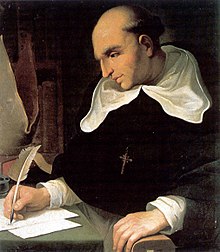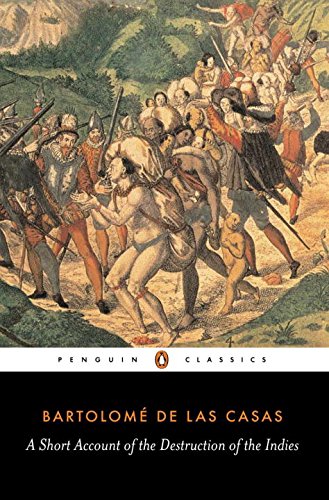Background
He was born in Seville, Spain in 1474. A member of a noble family of French extraction.



(Bartolomé de Las Casas was the first and fiercest critic ...)
Bartolomé de Las Casas was the first and fiercest critic of Spanish colonialism in the New World. An early traveller to the Americas who sailed on one of Columbus's voyages, Las Casas was so horrified by the wholesale massacre he witnessed that he dedicated his life to protecting the Indian community. He wrote A Short Account of the Destruction of the Indies in 1542, a shocking catalogue of mass slaughter, torture and slavery, which showed that the evangelizing vision of Columbus had descended under later conquistadors into genocide. Dedicated to Philip II to alert the Castilian Crown to these atrocities and demand that the Indians be entitled to the basic rights of humankind, this passionate work of documentary vividness outraged Europe and contributed to the idea of the Spanish 'Black Legend' that would last for centuries. For more than seventy years, Penguin has been the leading publisher of classic literature in the English-speaking world. With more than 1,700 titles, Penguin Classics represents a global bookshelf of the best works throughout history and across genres and disciplines. Readers trust the series to provide authoritative texts enhanced by introductions and notes by distinguished scholars and contemporary authors, as well as up-to-date translations by award-winning translators.
http://www.amazon.com/gp/product/0140445625/?tag=2022091-20
clergyman historian Missionary writer
He was born in Seville, Spain in 1474. A member of a noble family of French extraction.
After completing his studies in law and theology at the University of Salamanca, he went to Santo Domingo.
With his father, Las Casas immigrated to the island of Hispaniola in 1502 on the expedition of Nicolás de Ovando. Las Casas became a hacendado and slave owner, receiving a piece of land in the province of Cibao. The preaching of the first Dominican monks led him to become a priest in 1510. His acceptance of an encomienda (grant of land and slaves) in Cuba in 1514 brought him face to face with the moral problem of the treatment of Indian workers. Las Casas solved the problem for himself by freeing his Indian slaves to Diego Columbus. He then dedicated his life to a crusade against the encomienda system.
When his efforts to correct the evils failed, Las Casas appealed in person to King Ferdinand (1515). The king's favorable response proved useless, since he died in 1516, but the Cardinal-Regent, Jimenez de Cisneros, appointed Las Casas universal procurator of Indians. It was then that Las Casas suggested the substitution of black slaves for Indian workers, a suggestion which he bitterly regretted in later life. The unfavorable report of an investigating commission blocked his reform program, but in 1520 Las Casas obtained permission from the Emperor-King Charles V to work an estate with free Indian labor. This experiment failed, and in 1523 the baffled reformer became a Dominican friar in Santo Domingo. It is true that laws of that year and of 1526 forbade harsh treatment of Indians and the setting up of new encomiendas, but these laws were not enforced. Las Casas returned to the struggle in 1530, when a memorial to the Council of the Indies secured a prohibition of encomiendas in Peru. Again there was no enforcement.
In 1536 the authorities of Guatemala, hoping to silence the tireless "Apostle of the Indies, " offered him absolute control of Tuzulutlan if he could subdue the natives of that district by peaceful means. He was recalled by his Dominican superior in 1538 and in 1539 was sent to Spain. Proof of the success of his work rests in the official change in title of the province from Tierra de Guerra ("Land of War") to Vera Paz ("True Peace").
The efforts of Las Casas resulted, on Nov. 21, 1542, in the enactment of new laws which prohibited the enslavement of Indians. Charles V also made him the bishop of Chiapas. Once more the laws were not enforced. They were repealed in 1544, and Las Casas, giving up his bishopric, returned to Spain.
He was the first officially appointed "Protector of the Indians". For 22 years he carried on his fight for the Indians. The most powerful and thorough account of his activities is in his Brevisima relacion de la destruycion de las Indias ("Very Brief Account of the Destruction of the Indies"). This contains exaggerations, but the facts were accepted by the contemporaries of Las Casas and have long been used by hostile critics of Spain and Spanish colonial administration.
The small town of Lascassas, Tennessee, in the United States has also been named after him.
(Bartolomé de Las Casas was the first and fiercest critic ...)
Some historians such as (Castro 2007) argue that he was more of a politician than a humanitarian, and that his liberation policies were always combined with schemes to make colonial extraction of resources from the natives more efficient.
